10 July 2013
 For the first time researchers in the emerging field of cognitive neuro-engineering and computational neuroscience will be meeting at the University of South Australia for a major symposium on July 11 and 12 at UniSA’s Mawson Lakes campus.
For the first time researchers in the emerging field of cognitive neuro-engineering and computational neuroscience will be meeting at the University of South Australia for a major symposium on July 11 and 12 at UniSA’s Mawson Lakes campus.
Bringing expertise in computer systems science and signals processing to apply these technologies to our understanding of brain science is fast developing as a new field of research with potential applications in treatments for mental health rehabilitation and the development of psychological resilience.
Chair of Defence Systems at UniSA, Professor Nanda Nandagopal says the symposium will foster the development of important new relationships for researchers in this field.
“Measuring what goes on in the brain when people perform a simple cognitive task, such as solving a puzzle, is incredibly complex,” Prof Nandagopal says.
“Tracking down cognitive impairments can be like finding a needle in a haystack.
“What engineers, cognitive psychologists and scientists working together hope to do first is to develop some understanding of the signals involved in normal cognitive function – using EEG data – so that we can establish a better baseline for understanding what happens when people have disturbance to that function.”
Prof Nandagopal says the primary aim of the symposium, which is being jointly hosted by the Defence Science and Technology Organisation (DTSO), will be to explore the systems, technologies, methodologies and techniques that are being employed successfully in cognitive neuro-engineering and computational neuroscience and consider their application in the defence context.
“We believe there is great potential for this work to feed into important treatments for post traumatic stress disorders, which we are increasingly aware, are often a consequence of serving in conflict zones for regular soldiers and peace keeping forces,” he says.
“What we discover will also have wider application for any victims of trauma and possibly for our understanding and treatment of conditions such as depression.
“We hope the symposium will be a further step in developing a community of researchers who can work collaboratively to tackle some of these important issues by using this new dimension in understanding complex brain functions.”
The symposium will be attended by researchers from across the country including mathematician and engineer, Prof Jonathon Manton, Future Generation Professor and distinguished Chair at Melbourne University who will give the keynote address.
Prof Janet Giles from the University of Queensland, Assoc Prof Ric van der Zwan from Southern Cross University and Assoc Prof Vijiyalaksmi from PSG Tech, Anna University in India will also be giving keynote addresses.
Media contact: Michèle Nardelli office: 08 8302 0966 mobile: 0418 823 673 email: Michele.nardelli@unisa.edu.au




